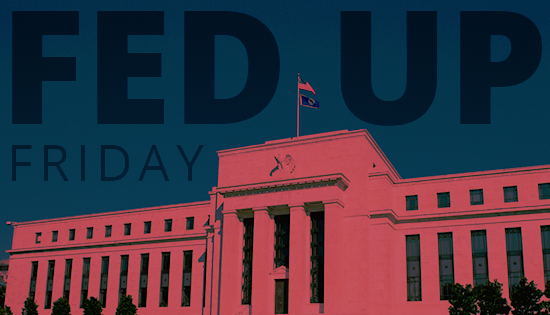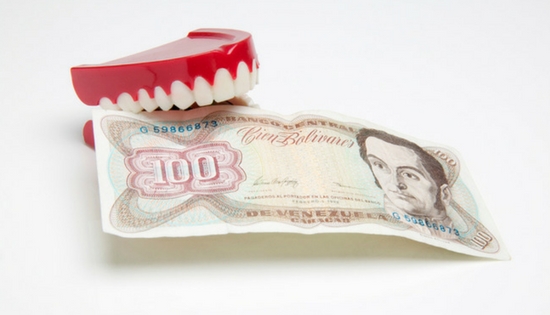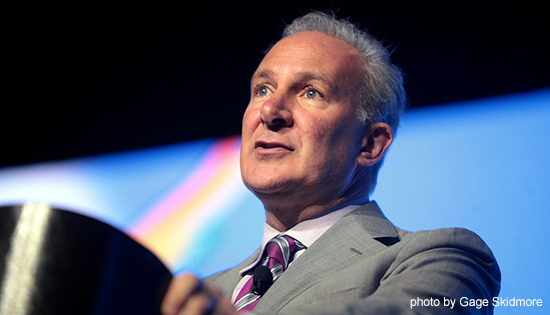Peter Schiff appeared on MSNBC’S “Up with Chris Hayes” with a panel of other experts and pundits to debate the Fed’s role in the housing bubble, Republican views on the economy, and the effects of inflation on prices.
Peter had a spirited exchanged with Karl Smith, Economics Professor from the University of Carolina, on the causes of the housing crisis. Smith took the typical stance of blaming complicated investment instruments for creating confusion in the market. Peter countered with the primary cause stemming from a combination of artificially low interest rates and Fannie and Freddie’s role in making cheap mortgages available to too many people who couldn’t afford them.
Fed Up Friday: Gold Still Strong Investment, Regardless of FOMC Direction
This week marked the full release of the 2011 FOMC transcripts, revealing troubling details from the meeting notes. As the Federal Reserve looks to see a big shakeup in 2017, gold is looking at a win-win situation. Learn more in this week’s Fed Up Friday.
Three Elements that will Stir Up the Fed in 2017
Trump’s administration represents a changing of the guard in Washington, and the Fed is not immune. Out of everything expected, a few key changes will really shake things up for the FOMC. First, in 2017 we’ll be getting 3 new voting members. Their records seem to lean more dovish than the counterparts they’ll be replacing, which may influence the number of rate hikes for 2017.
Second, the Fed’s plan shows that they don’t feel the need for fiscal policy to achieve their monetary goals. From their perspective, the nation has reached peak employment – (regardless of how many are actually underemployed) – and fewer barriers are in their way to increase inflation.
Finally, Trump will be selecting new members to fill two vacant slots on the Fed Reserve Board. That and Yellen’s term expiring in early 2018 should be the big moves for building a new monetary regime.



While many small business owners are celebrating Barak Obama’s exit as Commander-In-Chief, Peter Schiff is skeptical about Trump repealing enough Federal regulations to help return us to a free market. Small business owners face many more problems finding financing and handling business regulations than corporations.
Donald Trump’s press conference gave gold a rollercoaster ride on Wednesday as prices hit a 6-week low ahead of the president-elect’s speech, only to rally back to its highest point in 7 weeks. Spot gold moved from $1,176.94 to $1,198.40, the highest since late November.


Investors made a move into the yellow metal after the dollar took a tumble, according to Reuters. Stocks saw a negative move as well. Pharmaceutical stocks lead an overall decline in the market after Trump made comments about drug companies “getting away with murder” by price gouging their customers.
In his weekly radio address to his citizens, Venezuela’s post-Hugo Chavez leader, President Nicolas Maduro, announced he would raise the minimum wage for the fifth time over the last year. The bump puts the minimum salary at 40,683 bolivars or $60 per month, according to Reuters.
The new minimum wage represents a 322% cumulative increase since February 2016 and is an attempt to protect citizens’ wages from “mafia attacks,” according to Maduro. The President attributed his country’s woes to anti-socialist political opponents and capitalists who have created an “economic war” to foment disorder and unrest.


In his latest podcast, Peter Schiff illustrates the important differences between cryptocurrencies like Bitcoin and a gold transaction account like Goldmoney when it comes to convenience and preserving wealth. Essentially, it comes down to the technological risks and the price volatility of the underlying currencies. Here’s a breakdown of Peter’s major points:


Convenience
One advantage cryptocurrencies have over physical precious metals is the ease of transaction, but it comes at a cost. Bitcoin is a completely digital currency, so you can spend or transfer it just like cash. However, with a Goldmoney account, gold owners can now enjoy the same convenience, whether they’re depositing, sending or receiving transfers through an app or paying with a Goldmoney MasterCard.
“It’s not about Goldmoney being the substituted for Bitcoin,” Peter explains. “It’s gold itself. Gold is what you want to own, not Bitcoin. Goldmoney makes gold as convenient to use as Bitcoin. In fact, I think more convenient to use when it comes to commerce because you can deposit some of your gold in your Goldmoney account and now it takes all of those liquid characteristics that so many people like about Bitcoin.”
This week, the national debt edged closer to $20 trillion, double what it was at the beginning of Obama’s presidency. The FOMC minutes were also released from their latest meeting. As it turns out, the Federal Reserve just doesn’t know how Trump’s incoming presidency will affect the economy.
Trump is Stumping the Federal Reserve
Some are calling it a “climate of uncertainty” for the economy this year, and the Fed doesn’t seem to know what to expect from Trump when he takes office in a few weeks. FOMC expectations are high that the president-elect’s tax cuts and fiscal spending will goad inflation to rise, increasing the need for interest rate increases. At this point, some Fed members can’t decide if Trump’s going to grow the economy or balloon inflation. Given the abundance of uncertainty in European politics and policies at home, the Fed’s path to three rate increases this year will be a rocky one.





Gold per troy ounce (toz or oz) in $ terms has slumped by a whopping 11% since the November 8, 2016 election. The dollar’s trade-weighted value, meanwhile, has risen by 4% over the same period, while the value of the 10-year Treasury has fallen by a considerable 6% and the S&P 500 has rallied by 6%. What happened? In a nutshell, perception changed. Traders bet on more fiscal stimulus-based growth, lower corporate taxes, higher federal deficits, higher nominal interest rates, and higher inflation, so stocks went up, bonds went down, and the buck went up.
Oil prices rose and the dollar weakened Wednesday as gold futures maintained a three-week high even as the release of FOMC minutes seemed to suggest a more aggressive rate hike schedule was being considered, according to MarketWatch.
After its vote last month to raise the Federal funds rate 25 basis points, the Fed estimated three quarter-point rate increases for 2017. However, the FOMC minutes suggested there were a “number of risks” that would necessitate a “different path of policy” than they expected. One of those “risks” was clearly Trump’s stimulus plan, and the “uncertainty regarding fiscal and other economic policies.”


In his latest podcast, Peter Schiff lays out why optimism for the US dollar in 2017 is just wishful thinking. Trump’s tax cuts and increased spending are likely to create only a fraction of the stimulus most people expect, given the budget deficits and national debt we face. Investor hopes also reside with Trump’s tax plan to include an import tax that would correct US trade deficits with China. However, taxing imported goods will only drive up the cost of consumer goods, negate any increase in consumer spending, and diminish the purchasing power of the dollar. Peter explains:
“When the cost of importing goes up, it’s not like Americans are just going to switch from buying goods made in China to goods make in America. No, they’re just going to have to pay more to buy the goods made in China. If they don’t have the extra money, they just won’t buy as much. So, what’s going to happen as a result of increasing the cost of importing is that consumers will spend less and the bubble economy will deflate. There will be less consumer spending because consumers won’t have as much money or won’t be able to afford the higher prices. It’s going to have a negative effect on GDP.”





